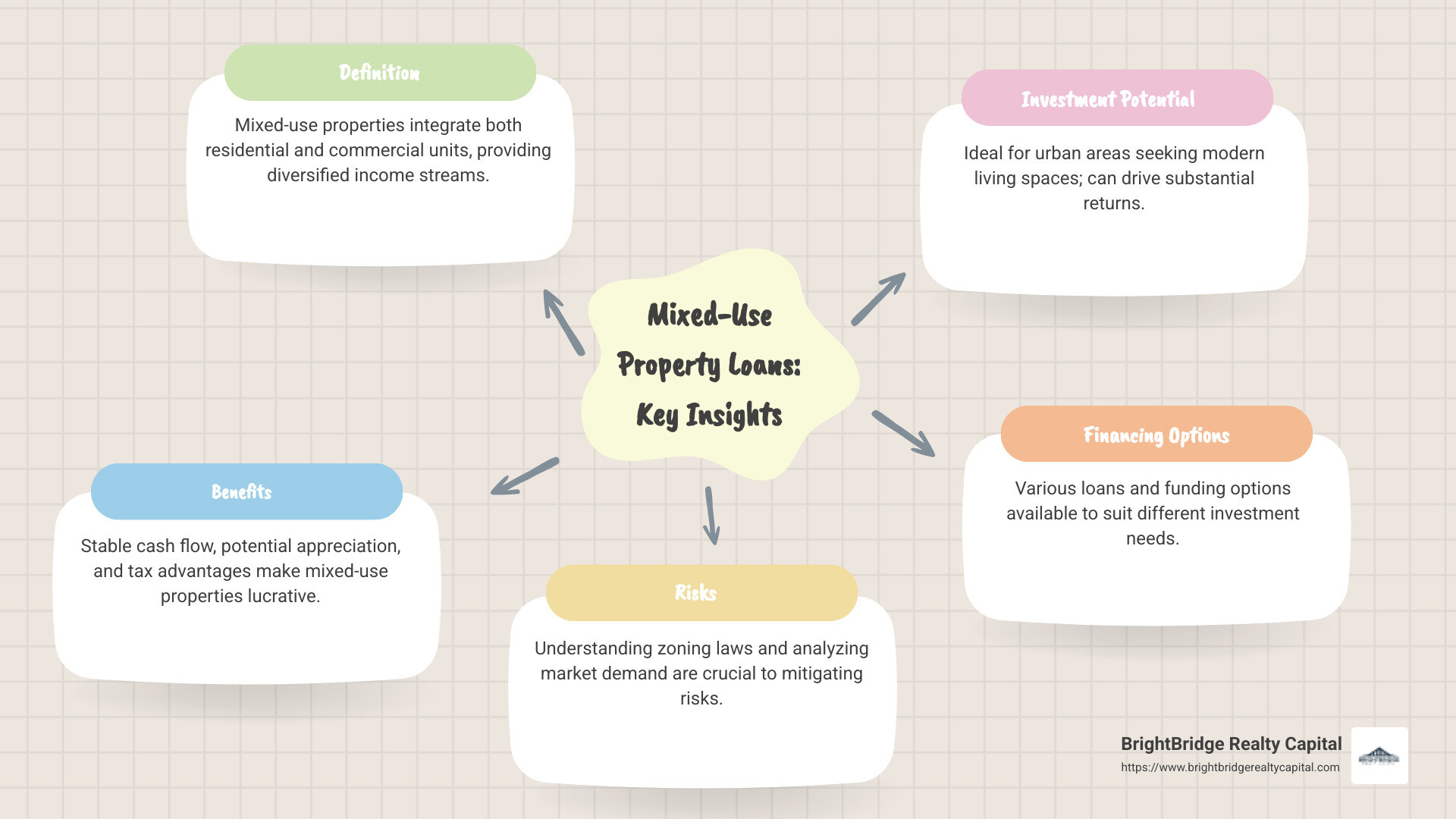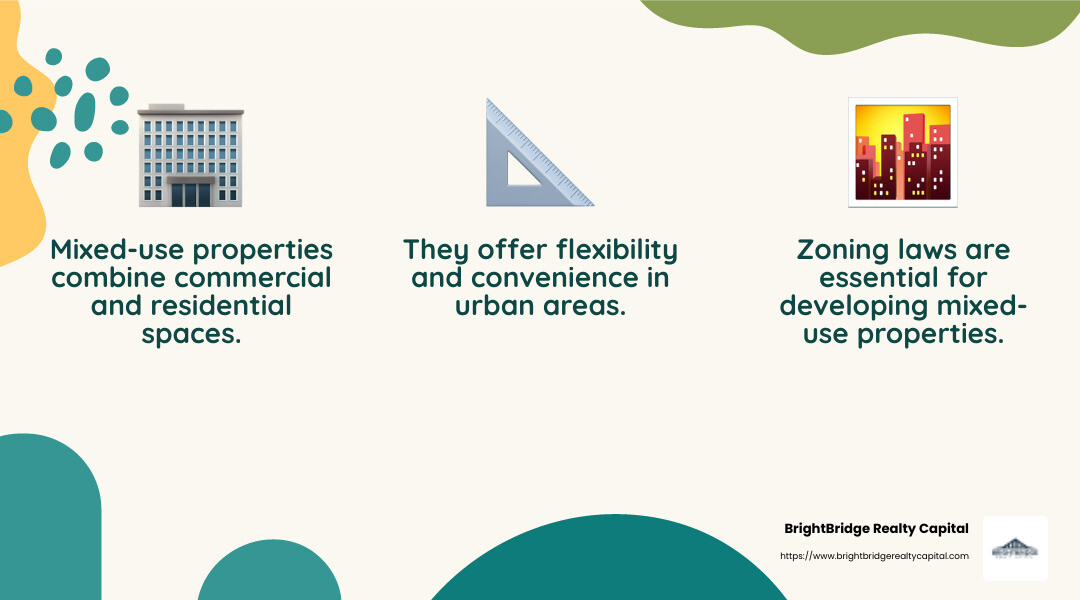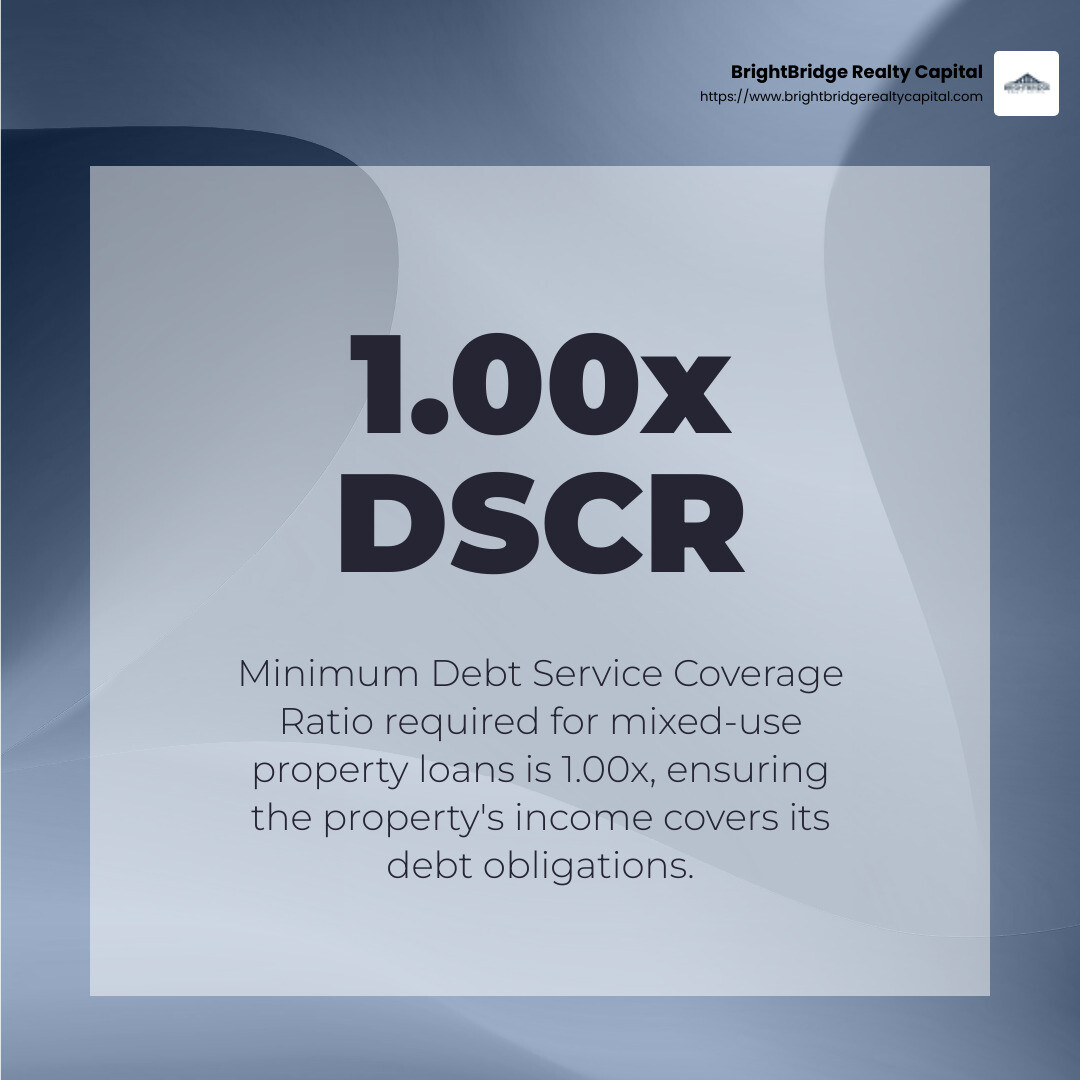Mixed-Use Property Loans: How to Finance Your Next Investment

Mixed-use property loans offer a unique opportunity for real estate investors looking to diversify and maximize their investments. Combining commercial and residential spaces, these properties blend the convenience of living and working in the same area. They also often come with dynamic earning potential.
Key points about mixed-use property loans you should know:
- Definition: Mixed-use properties integrate both residential and commercial units, providing diversified income streams.
- Benefits: From stable cash flow and potential appreciation to tax advantages, mixed-use properties can be a lucrative investment choice.
- Risks: Investors should understand zoning laws and market demand.
As urban landscapes evolve, the demand for modern living spaces grows. Investing in mixed-use properties not only meets this demand but also allows you to capitalize on versatile property usage. For investors in rapidly urbanizing areas, these properties can drive substantial returns. Whether you're considering a "Main Street" development or a live/work space, financing your next mixed-use property can improve your portfolio's value and resilience.

Simple guide to mixed-use property loans terms:
Understanding Mixed-Use Properties
Mixed-use properties are an exciting blend of commercial, residential, and sometimes industrial spaces. They bring together different property types under one roof, offering both versatility and convenience.
What Makes Up a Mixed-Use Property?
Commercial Spaces: These are the shops, restaurants, or offices you might find on the ground floor. They draw foot traffic and provide services to the community.
Residential Units: Often located above the commercial spaces, these are apartments or condos where people live. Residents enjoy the convenience of having amenities just a few steps away.
Industrial Components: Occasionally, a mixed-use property might include light industrial spaces. These are less common but can be found in urban areas where small-scale production or warehousing is needed.
The Role of Zoning
Zoning is crucial in developing and managing mixed-use properties. It determines what types of buildings can coexist in a particular area. Mixed-use zoning allows for the integration of residential, commercial, and sometimes industrial units within the same development.

Why Zoning Matters:
- Flexibility: Proper zoning enables a mix of uses that can adapt to market demands.
- Community Development: It encourages vibrant neighborhoods where people can live, work, and play.
- Investment Potential: Properties in well-zoned areas often see higher appreciation due to their desirability.
Examples of Mixed-Use Developments
Main Street Developments: These are traditional setups where you might find shops on the street level and apartments above. They foster a sense of community and accessibility.
Live/Work Spaces: Perfect for entrepreneurs, these spaces allow people to operate businesses and live in the same location, reducing commute times and enhancing work-life balance.
Residential and Office Combinations: These cater to professionals who prefer living close to their workplace, often found in urban centers.
Understanding the dynamics of mixed-use properties can significantly impact your investment decisions. By blending different property types, you not only diversify your income streams but also contribute to sustainable and vibrant community growth.
Benefits of Investing in Mixed-Use Properties
Investing in mixed-use properties isn't just about owning a building; it's about owning a vibrant community hub. Let's explore the key benefits that make these properties a smart investment choice.
1. Diverse Tenant Market
Mixed-use properties naturally attract a wide range of tenants. This diversity means you’re not reliant on one type of tenant or industry. If the retail sector is slow, for example, residential tenants can still provide steady income. This broad appeal helps keep occupancy rates high and reduces the risk of vacancies.
2. Less Risk
The varied tenant mix in mixed-use developments offers a cushion against market fluctuations. If one sector faces a downturn, others might thrive. This diversification spreads risk, making these properties more resilient to economic changes. As the research highlights, a well-managed mixed-use property tends to have less risk compared to single-use properties.
3. Convenience
Convenience is a significant draw for both tenants and consumers. Mixed-use properties often combine living, shopping, and dining in one location. This setup attracts foot traffic, benefiting retail tenants and enhancing the appeal for residential occupants. People love the idea of having everything they need within walking distance, which can lead to higher demand and potentially higher rents.
4. Sustainable Real Estate
By encouraging people to live, work, and play in the same area, mixed-use developments promote sustainability. They reduce the need for long commutes, which can lower carbon emissions and traffic congestion. This eco-friendly approach not only conserves natural resources but also aligns with growing consumer preferences for sustainable living options.
Investing in mixed-use properties is about more than just potential financial returns. It's about creating dynamic spaces that meet the evolving needs of modern communities. This blend of benefits makes them a compelling choice for savvy investors looking to diversify their portfolios and make a positive impact.
Types of Mixed-Use Property Loans
When it comes to financing mixed-use properties, understanding the different loan types is crucial. Let's break down the main options available to investors.
Commercial Loans
Commercial loans are the traditional route for financing mixed-use properties. These loans are typically offered by banks and other financial institutions and can range up to $15 million. They often come with competitive fixed and adjustable rates, and terms ranging from 5 to 30 years. A commercial loan is a solid choice if you're looking to finance a larger property or if you need a more significant amount of capital.
DSCR Loans
Debt Service Coverage Ratio (DSCR) loans are becoming increasingly popular for mixed-use properties. Unlike traditional commercial loans, DSCR loans focus on the property's income-generating potential rather than the borrower's personal income. This means that even if you don't have a high personal income, you can still qualify if the property generates enough revenue to cover the loan payments.
One of the standout features of DSCR loans is their flexibility. They often have no income verification requirements, making them accessible to a broader range of investors. Interest rates might start around 7.750%, with options for 30-year fixed rates or hybrid adjustable-rate mortgages (ARMs). This flexibility makes DSCR loans an attractive option for investors looking to maximize their cash flow.
Fixed-Rate Loans
Fixed-rate loans offer stability and predictability, which can be particularly appealing in a fluctuating market. With a fixed-rate loan, your interest rate remains constant throughout the loan term. This means your monthly payments won't change, making it easier to budget and plan for the future. Fixed-rate loans are a good choice if you prefer a consistent payment schedule.
Adjustable-Rate Loans
Adjustable-rate loans, on the other hand, offer lower initial interest rates compared to fixed-rate loans. However, these rates can change over time based on market conditions. The initial lower rates can be beneficial if you plan to refinance or sell the property before the rates adjust. Hybrid ARMs are a popular option in this category, offering a fixed rate for an initial period before switching to an adjustable rate.
In summary, the type of loan you choose for your mixed-use property will depend on your financial situation, investment goals, and risk tolerance. Whether you opt for the stability of a fixed-rate loan or the flexibility of a DSCR loan, understanding these options will help you make a more informed decision.
How to Qualify for Mixed-Use Property Loans
Qualifying for mixed-use property loans might seem complex, but breaking it down can simplify the process. Here's what you need to know about the key requirements.
Loan Requirements
To start, you'll need to meet specific loan requirements. These include having a property that qualifies as mixed-use, which typically means it combines residential and commercial spaces. Most lenders, including BrightBridge Realty Capital, require that the residential portion must be the majority. This means over 51% of the property's rentable space should be residential.
Down Payment
The down payment for a mixed-use property loan is generally higher than for a standard residential mortgage. A 25% down payment is a common requirement. For example, if you're eyeing a property valued at $533,333, you'd need at least $133,333 upfront. This ensures that the lender has a solid equity cushion in the property.
Credit Score
Your credit score plays a crucial role in qualifying for a loan. While traditional commercial lenders might require a score of 700 or higher, some DSCR loans are more lenient. They focus more on the property's income potential than personal creditworthiness. However, maintaining a good credit score is always beneficial, as it can help secure better interest rates and terms.
DSCR Ratio
The Debt Service Coverage Ratio (DSCR) is a critical metric for qualifying for mixed-use property loans, especially DSCR loans. This ratio compares the property's net operating income to its debt obligations. A DSCR of 1.00x is often the minimum requirement, meaning the property should generate enough income to cover the loan payments.
The calculation is straightforward: divide the property's income by the total debt service. For example, if a property earns $100,000 annually and the debt service is $100,000, the DSCR is 1.00x. This indicates the property can meet its debt obligations without relying on external income.

Understanding these requirements can help you better prepare when applying for a mixed-use property loan. By ensuring you meet the down payment, credit score, and DSCR criteria, you'll be in a strong position to secure financing for your investment.
Financing Options for Mixed-Use Properties
When it comes to financing mixed-use properties, several options are available. Each comes with its own set of benefits and requirements. Let's explore some of the most popular choices.
Fannie Mae Loans
Fannie Mae offers a unique opportunity for those looking to finance mixed-use properties. These loans are primarily for residential properties but allow for a small commercial component. The key requirement is that the property must be primarily residential, with the commercial space not exceeding a certain percentage of the total area. This option is ideal for those who plan to live in the property and operate a small business on-site.
SBA Loans
The Small Business Administration (SBA) provides loans that can be used for mixed-use properties, especially if the commercial component is significant. The SBA 504 loan, for instance, is designed for businesses looking to purchase or refinance properties. It combines funding from a private lender and a CDC, covering up to 90% of the property’s purchase price. These loans often come with competitive interest rates and longer repayment terms.
USDA Loans
For those considering mixed-use properties in rural areas, USDA loans might be a viable option. These loans are primarily aimed at promoting rural development and can be used for properties that have a commercial element. The benefits include no down payment requirement and favorable interest rates, but eligibility is restricted to certain geographic locations.
Interest Rates
Interest rates on mixed-use property loans can vary based on the type of loan and the lender. Typically, interest rates for mixed-use properties are higher than those for purely residential properties due to the increased risk. However, securing a loan with a strong lender like BrightBridge Realty Capital can help you lock in competitive rates.
Understanding these financing options can help you make an informed decision when investing in a mixed-use property. Each option has its advantages, so consider your specific needs and circumstances when choosing the best loan for your investment.
Frequently Asked Questions about Mixed-Use Property Loans
What is a mixed-use property?
A mixed-use property combines commercial and residential spaces, and sometimes even industrial units, under one roof. These properties are designed to serve multiple purposes, typically featuring residential units like apartments above or alongside commercial spaces such as shops or offices. This blend allows for a vibrant community atmosphere where people can live, work, and shop in close proximity.
How do I manage a mixed-use property?
Managing a mixed-use property can be complex due to the diverse needs of residential and commercial tenants. Here are some key considerations:
Zoning Laws: Understanding local zoning laws is crucial. These laws dictate what types of businesses can operate within your property. Make sure you're compliant to avoid legal issues.
Property Management: Hiring experienced property managers can make your life easier. Look for managers who have experience with both residential and commercial properties to ensure smooth operations.
Tenant Relations: Balancing the needs of different tenants is essential. Residential tenants may have different expectations regarding noise levels and maintenance compared to commercial tenants. Effective communication and clear lease agreements can help manage these expectations.
Are mixed-use properties hard to insure?
Insurance for mixed-use properties can be more complex than for single-use properties. Here's why:
Risk Evaluation: Insurers must evaluate a broader range of risks, such as fire hazards from a restaurant or liability issues from a retail store. This often results in higher premiums compared to single-use properties.
Policy Complexity: Because of the varied nature of mixed-use properties, insurers typically require more detailed policies. You may need separate coverage for the residential and commercial components.
Finding the Right Insurer: It's important to work with an insurer familiar with mixed-use properties. They can help tailor a policy that covers all potential risks, ensuring comprehensive protection for your investment.
Understanding these aspects of mixed-use property loans can help you steer the complexities of managing and insuring such investments. Whether you're considering buying or already own a mixed-use property, being informed will empower you to make better decisions.
Conclusion
In real estate, timing is everything. At BrightBridge Realty Capital, we understand that securing funding quickly can make all the difference in your investment journey. Our fast closings ensure that you don’t miss out on lucrative opportunities. We often close deals within a week, allowing you to move forward without delay.
What sets us apart is our approach to direct lending. By eliminating intermediaries, we offer competitive rates and a streamlined process that simplifies securing a mixed-use property loan. Our team is dedicated to providing customized solutions custom to your unique needs, ensuring you have the financial backing to make your investment a success.
Whether you're a seasoned investor or just starting, our expertise in mixed-use property loans can help you steer the complexities of real estate financing. With our support, you can focus on what truly matters: growing your investment portfolio.
For more information about our services and how we can assist you in your next real estate venture, visit BrightBridge Realty Capital. Let's bridge the gap between your investment goals and the financing you need to achieve them.


